In this week’s review of Court Judgments, we look at Bombay High Court’s judgment of appointing aunt as guardian of 4-year old child, MP High Court verdict that higher education of a wife should not be consideration for not receiving maintenance, Karnataka High Court’s observation that POCSO Act takes precedence over Prevention of SC, ST Atrocities Act and Madras High Court judgment that hospitals cannot refuse to perform transplants from non-related donors. We also highlight few important aspects from the latest judgment of Supreme Court on Same Sex marriage.
Bombay HC: Appoints aunt as guardian of 4-year-old in context of Mother’s psychological issues and father’s aggression.
A single Judge Bench of Bombay High Court consisting of Justice RI Chagla has recently appointed the paternal aunt of a four-year-old as his legal guardian while allowing his parents to visit him but ensuring that the child remains and returns to the aunt’s custody on the same day.
While granting custody of the child, the judge took cognizance of the fact that the child is emotionally attached to his aunt and also noted the psychological issues faced by his mother and the aggressive behaviour of the father.
Earlier, the court proposed for a shared custody of the child but was met with resistance from the father. A commissioner was appointed to determine the most suitable residence for the child. The commissioner’s report which assessed the living conditions of the biological parents as well as the aunt, stated that her residence provided the best environment for the child.
The petition filed by the aunt was a guardianship petition. She is a widow with no child, and she sought to establish herself as the legal guardian of the child i.e., her brother’s son. In the petition, she cited her ability to care for the child, including her financial capability to care for the child.
She stated that the parents lived in her house for a period after the birth of the child. However, due to the logistical inconvenience involved in the medical treatment of the mother, the child was left with her to be looked after.
Later, a case was filed by the father against his sister stating that she had abducted the child. The police did recognise that she had been entrusted by the child’s parents. She further stated that the health of the child deteriorated in the few months he was with his parents. This claim was denied by the father who stated that the aunt had forcibly taken the child from them.
The court referred to several of the Supreme Court’s cases wherein it was emphasised that a child’s welfare is of paramount importance.
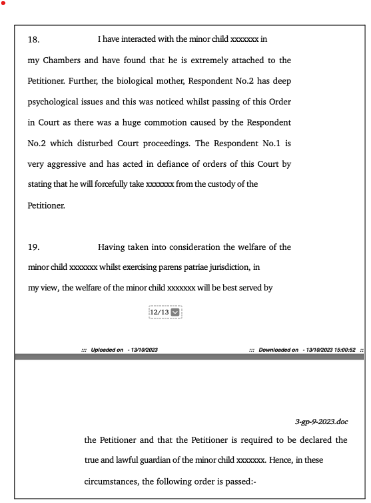
Madhya Pradesh HC: Wife having a degree of higher education can’t be basis to disentitle her to maintenance
The Madhya Pradesh High Court observed that a wife having a higher degree cannot be the basis of disentitling her to maintenance. As per the details of the case, a Criminal Revision plea was filed by the husband Mohammed Nadeem, under Section 19(4) of the Family Court Act, 1984 against the Family Court’s order directing him to pay his wife an amount of Rs. 10,000 per month as maintenance.
The contention of the husband was that the wife resided with him for merely 18 months and could not be penalised a higher amount. An argument was also put forth stating that she holds an MBA degree and is earning around Rs. 28 thousand while his income is only about Rs. 20.9 thousand. The counsel relied on the judgment in the case Niharika Ghosh vs. Shankar Ghosh, where it was stated that a wife cannot be entitled to maintenance by the husband when she is highly qualified and has been earning even after her marriage, though she does not truthfully disclose her true income.
However, the court opined that if a wife has a degree of higher education, it cannot be ascertained that she is able to maintain herself. It further noted that the petitioner himself had relinquished his wife without any reason and therefore the allegation that she is residing voluntarily with her parents is baseless.
Regarding the maintenance amount, the court referred to the judgment in the case Kalyan Dey Chowdhary vs. Rita Dey Chowdhary nee Nandy.
The court noted that the wife was earlier working and is not working now. Furthermore, as per the salary certificate of the petitioner, he is earning around Rs. 40 thousand per month. It noted that the court must figure out what is required by the wife to maintain a standard of living that is neither luxurious nor penurious, but it should be in accordance with the status of the family.
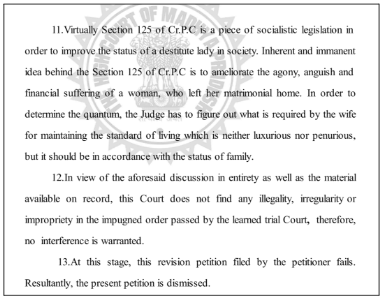
Karnataka HC: POCSO Act prevails over SC-ST Act
Justice S Vishwajith Shetty of Karnataka High Court has held that where the offences punishable under the provisions of two special enactments i.e., the Scheduled Castes and Tribes (Prevention of Atrocities) Act and POCSO Act are invoked, the POCSO Act, being a later enactment, should prevail over the Atrocities Act.
As per the details of the case, Somashekhar vs. State by Rural Police Station, the petitioner had approached the Court seeking bail in a case accusing him of offences under Sections 448, 504, and 305 of IPC, Section 12 of the POCSO Act, and Section 3(2) of Atrocities Act.
As per the complaint, the petitioner allegedly pestered the complainant’s minor daughter to be in a romantic relationship with him. On the day of the incident, the petitioner entered the complainant’s house and quarrelled with the daughter, urging her to love him. He allegedly abused and threatened her which allegedly drove her to suicide.
His first bail application was dismissed by the trial court, and hence he approached the High Court. An objection was raised regarding the petition’s maintainability claiming that because the petitioner was charged under the Atrocities Act, an appeal should be filed as mandated by Section 14A (1) of the Act. Alternatively, it was argued that the material on record established a prima facie case against the petitioner and urged the court to dismiss the petition.
The bench stated that the Atrocities Act and the POCSO Act are special enactments. The Atrocities Act was enacted in 1990, while the POCSO Act was enacted in 2012. Section 20 of the Atrocities Act provides for the overriding effect of the said Act, while Section 42A of the POCSO Act provides for the overriding effect of the POCSO Act.
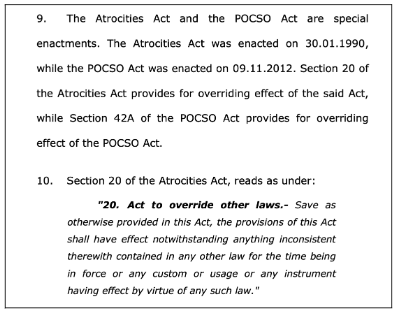
It further noted that that there was no allegation in the complaint that the petitioner had misbehaved with the complainant’s daughter except by asking her to love him. It also made an observation that the behaviour of the complainant and her brother-in-law, who were present during the incident but did not intervene when the petitioner allegedly abused and pestered the girl, raised doubts about the allegations made in the complaint.
Allowing the petition, the court granted the accused bail.
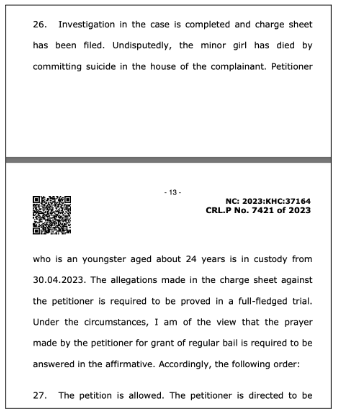
Madras HC: Hospitals cannot refuse to perform transplants from non-related donors.
In the case, Dr.J.Kaja Moinudeen vs. The Authorization Committee (Transplantation), the Madras High Court has noted that transplantation has been permitted from non-relative donors as per Section 9(3) of the Transplantation of Human Organs and Tissues Act, 1994 and Rules 14 and 19 of the Transplantation of Human Organs and Tissues Rules, 2014.
It stated that hospitals denying such transplants is illegal. It noted that the apprehensions of the hospitals are due to inadequate awareness of the law. In this case, the court was looking into the plea of Kaja Moinuddeen, who has been suffering from chronic kidney disease since June 2022. He himself is a doctor. He was advised to undergo a kidney transplant. While the attempts to get a donor from the family failed, a well-wisher has offered to donate a kidney. Moinudeen stated that when he approached the hospitals in Tamil Nadu, the doctors did not entertain this idea. Hence, he has to approach a hospital in Kerala. He informed the court that all documentation process was completed except for an NOC under Section 9(4) of the Act. Moinudeen told the court that he was in a fix as the Authorization Committee in Tamil Nadu was saying that the NOC was not necessary while the Authorization Committee in Kerala stressed the need for one.
The court pointed out that as per the 2014 Rules when the donor was a non-relative, the only requirement was a verification of the residential status by the Tahsildar or other authorized officer of the donor or the recipient when either of them resided at a State/UT other than the State/UT where the transplantation was proposed to be done. It also noted that the NOC requirement is no longer needed, and it pertains to an earlier 2008 Rule.
The court directed Moinudeen and his donor to appear before the Authorisation Committee for approval. The court also directed the Tahsildar to conduct an inquiry in terms of Rule 14 of the Transplantation Rules and submit a report to the Authorisation Committee which shall then examine the case in line with the parameters prescribed under the Rules and pass orders approving or rejecting the case.
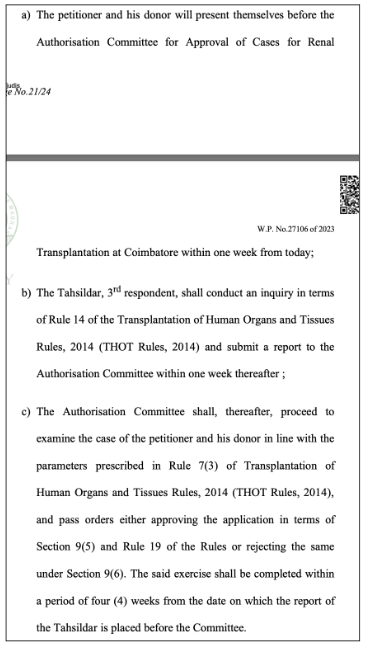
Same Sex Marriage Case: Supreme Court rules that Parliament to decide on Legal status.
The Five-judge constitutional bench headed by Chief Justice DY Chandrachud and including Justices Sanjay Kishan Kaul, S Ravindra Bhat, Hima Kohli, and P S Narasimha has ruled that there cannot be legal recognition for same-sex marriages, doing so by a 3-2 majority.
The petitioners of the case stressed the equal rights of the LGBTQIA+ community and pushed to acknowledge such a union which would ensure LGBTQIA lead a ‘dignified’ life like heterosexuals. Our article related to the benefits availed by married couples can be read here.
The Centre had opposed the pleas arguing that the legislative policy of India has consciously validated a union only between a biological man and a biological woman. It also said that it would constitute a committee headed by the cabinet secretary to examine administrative steps that could be taken to address genuine concerns of same-sex couples without going into the issue of legalising their marriage.
Chief Justice of India D Y Chandrachud, who was heading the bench pronouncing the verdict on 21 pleas seeking legal validation for same-sex marriages, said the court can’t make law but only interpret it and it is for Parliament to change the Special Marriage Act.
A few of the highlights from the judgment are:
- The court can’t make a law. It can only interpret it and give effect to it.
- Queerness or homosexuality is not an urban concept or restricted to the upper class of society. It can be regardless of one’s caste, class, or socio-economic status.
- Without the Right to marry which can be given by legislature, the LGBTQIA+ community members have the right to choose a partner and the right to intimate association. The state must recognise a bouquet of their rights to enable such couples to enjoy rights of association unhindered.
- If two transgender persons intend to marry, or identify themselves as trans-man and trans-woman, their marriage can be registered under Special Marriages Act.


